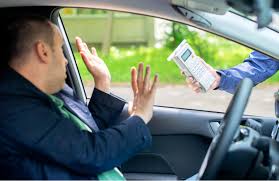
California’s strict DUI (Driving Under the Influence) laws impose severe penalties on all drivers. For those holding a Commercial Driver’s License (CDL), the ramifications can be particularly harsh, potentially jeopardizing one’s livelihood. This blog delves into the specific statutes and penalties that affect commercial drivers, particularly focusing on Vehicle Code section 23152(d), different DUI scenarios, suspension periods, refusal of chemical tests, options for restricted licenses, possible defenses, and the importance of securing a knowledgeable Huntington Beach DUI lawyer.
Understanding VC 23152(d)
The cornerstone of California’s DUI laws for commercial drivers is encapsulated in Vehicle Code 23152(d), which specifically targets individuals operating commercial vehicles. Unlike the general DUI law, which sets the blood alcohol concentration (BAC) limit at 0.08% for non-commercial drivers, VC 23152(d) mandates a stricter lower threshold of 0.04% BAC for commercial drivers. Thus, even minimal alcohol consumption can result in a DUI charge for commercial drivers, subjecting them to grave consequences.
DUI in a Commercial Vehicle

Driving under the influence in a commercial vehicle exponentially increases the gravity of the offense. Commercial vehicles, given their size and weight, pose a greater risk to public safety when mishandled. Hence, a DUI while operating a commercial vehicle not only leads to criminal penalties but also triggers stringent administrative actions against the driver’s commercial license.
DUI in a Non-Commercial Vehicle
Surprisingly, commercial driver’s license holders are not spared from severe repercussions even when the DUI offense occurs in a non-commercial vehicle. A commercial driver arrested for DUI in their personal car faces similar penalties as if they were in a commercial vehicle. This dual applicability underscores the heightened responsibility placed on commercial drivers both on and off the job.
Suspension Periods
California imposes rigorous suspension periods for DUI offenses involving CDL holders. Upon the first DUI conviction (whether in a commercial or non-commercial vehicle), a commercial driver faces a one-year disqualification of their commercial driving privileges, apart from any other license suspension applied due to the DUI charge. A second DUI conviction results in a lifetime disqualification from holding a CDL, effectively ending many drivers’ commercial careers. These suspension periods emphasize the zero-tolerance policy California employs to ensure the safety and accountability of commercial drivers.
Refusing a Chemical Test

Refusal to submit to a chemical test can exacerbate an already dire situation for CDL holders. Under California’s Implied Consent Law, by driving a vehicle, a driver consents to chemical testing if suspected of DUI. Refusal results in automatic penalties, including a one-year disqualification of the CDL for the first refusal and permanent disqualification upon a second refusal. Additionally, refusing a test can also be used as evidence of guilt in court, further complicating the defense strategy.
Restricted License
In certain circumstances, drivers may be eligible for a restricted license that allows them to drive under limited conditions. However, commercial drivers face stringent restrictions. After a first DUI conviction, a non-commercial restricted license may be granted to allow driving to and from work, school, and DUI alcohol programs. Importantly, these restricted licenses do not permit the operation of commercial vehicles, meaning CDL holders cannot resume their professional driving activities under a restricted license.
Defenses Against DUI Charges
Commercial drivers facing DUI charges have a myriad of potential defenses at their disposal. Some common defenses include:
1. Inaccurate BAC Readings: Your Orange County DUI lawyer can challenge the reliability or calibration of the breathalyzer or blood test equipment used.
2. Improper Stop: Contesting the legality of the traffic stop that led to the DUI arrest is a favored defense employed by skilled Huntington Beach DUI attorneys.
3. Field Sobriety Test Errors: An experienced Orange County DUI attorney will highlight improper administration or subjective interpretation of field sobriety tests.
4. Rising BAC Defense: If the drinking pattern is correct, your Orange County DUI lawyer will argue that the driver’s BAC increased between the time of driving and the time of testing.
Importance of an Orange County DUI Lawyer

Given the severe penalties and complex nature of DUI cases involving commercial drivers, obtaining a skilled Orange County DUI lawyer is imperative. A dedicated Orange County DUI attorney can navigate the intricate legal landscape, craft a robust defense strategy, and potentially mitigate the repercussions of a DUI charge. Legal representation is crucial to challenge evidence, negotiate plea bargains, and advocate for the client’s rights, all the while ensuring that procedural nuances are meticulously observed.
Conclusion
For commercial drivers, a DUI charge in California represents not just a legal hurdle but a significant threat to their career and livelihood. From understanding the specifics of VC 23152(d) to grappling with suspension periods and potential defenses, navigating the consequences of a commercial DUI requires comprehensive knowledge and expert legal assistance. Recognizing the severe implications and authorized resources for defending against DUI charges becomes paramount to preserving one’s professional and personal life.
Ensuring the use of an experienced Huntington Beach DUI lawyer can make a pivotal difference in the outcome of the case, providing commercial drivers the best opportunity to mitigate damage and, where possible, retain their driving privileges. Ultimately, the stakes in DUI cases for CDL holders are exceedingly high, necessitating meticulous attention to legal proceedings and defense strategies. By wisely leveraging available defenses and seeking the right legal counsel, commercial drivers can navigate this daunting legal challenge more effectively.